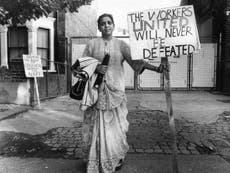Theresa May has a lot to say about domestic violence but little cash to back it up
The draft domestic abuse bill talks up the importance of the refuge movement, but the Government is still committed to supported housing reforms that imperil funding


Harriet Harman’s brutal verdict on Theresa May was that “she’s a woman – but no sister”. The case against Theresa May’s feminism is easy to rack up. There’s the support for reducing the abortion time limit to 20 weeks, compounded by giving the role of Tory vice-chair for women to anti-choice MP Maria Caulfield. There’s her record of voting for cuts to Sure Start centres and tax credits, two measures that have done much to lift up women in poverty. And there are the harms that her authoritarian immigration policy has done to women, most clearly at the Yarl’s Wood detention centre.
But even so, May can still credibly claim that her feminist credentials run deeper than a T-shirt. May’s commitment to tackling violence against women – both when she was at the Home Office and as prime minister – has won respect from the women’s sector, despite opposition on other issues. The draft Domestic Abuse Bill launched today is a signature bit of policy-making for her, and while Amber Rudd and David Gauke are the names on the document, May has positioned herself as its public face.
And there’s a lot in the document that’s very good. It outlines a comprehensive approach that covers everything from relationships and sex education to rehousing. Its ambitions would transform the way domestic abuse is handled at every level of justice, from first responders to the courts. Not just that: the draft bill wants to change the very way we see domestic abuse, by expanding the definition of economic abuse (when an abuser financially controls and exploits the victim). It shows a commitment to work with the women’s sector, rather than just imposing on them, with mentions for Women’s Aid, Southall Black Sisters and Respect, among other organisations.
It’s also committed to giving justice to women, proposing harsher sentences for abusers and electronic tagging to track suspects’ movements. There’s a persistent strain in feminism about the question of whether the criminal justice system can ever work for women – grotesque failures like the Worboys investigation show how badly a male-dominated police force can betray women, while an absolutist fringe rejects any involvement with criminal justice entirely and damns all other approaches as “carceral feminism”. It is, however, possible to bring feminist politics to a law-and-order approach. That’s been May’s ethos since she was home secretary, and it’s a vital one: women need to have an equal stake in the enforcement of the law.
It’s possible. It’s necessary. And it isn’t enough. It all has to be backed with serious cash, which is a subject about which the document has far too little to say. Labour MP Thangam Debbonaire worked in the women’s sector before entering Parliament, and she’s broadly welcoming of the proposals – but, she says, they don’t have enough detail on funding. “It needs cross-departmental working,” she explains. “Domestic violence services save money in the end, but it’s often not the department that put the money up that’s going to save money down the line. If the Treasury invested in health, for example, it might result in savings for justice, and the Treasury needs to be able to see beyond these silos for effective action.”
We need joined-up thinking in other ways too. The draft Domestic Abuse Bill talks up the importance of the refuge movement, but the Government is still committed to supporting housing reforms that imperil funding of refuges – on top of the effects of austerity, which means three-quarters of councils have reduced their spending on refuges since 2010 (with specialist refuges for BAME women often the biggest losers). It’s admirable to want to do more about economic abuse, but it’s futile while the Government is enforcing universal credit with its atrocious one-payment per household, which leaves women totally exposed to a coercive partner’s financial predation.
There’s one more issue that the draft bill fails to address. It’s quite right to repeatedly point out that domestic abuse is a hugely gendered issue: the majority of victims are women, the majority of perpetrators are men, and the more serious the offences the starker that gender difference is. But the Government is currently, at least notionally, committed to reforming the Gender Recognition Act so that legal sex becomes a matter of self-declaration, and there’s nothing in this document about how to accommodate that – whether that means responding to the particular needs of trans people, protecting female-only spaces for women who need them, or filtering out the abusive men who’d maliciously identify as women to further harass their victims.
So we should welcome the bill, and applaud all its good intentions. But if it becomes law without answering the questions about money, without addressing the fact that universal credit has reshaped the benefits system into a weapon for abusers and that eight years of cuts have gutted the refuge sector, and without pre-empting the tangle of gender identity reform, then good intentions are all it can ever offer.


Join our commenting forum
Join thought-provoking conversations, follow other Independent readers and see their replies